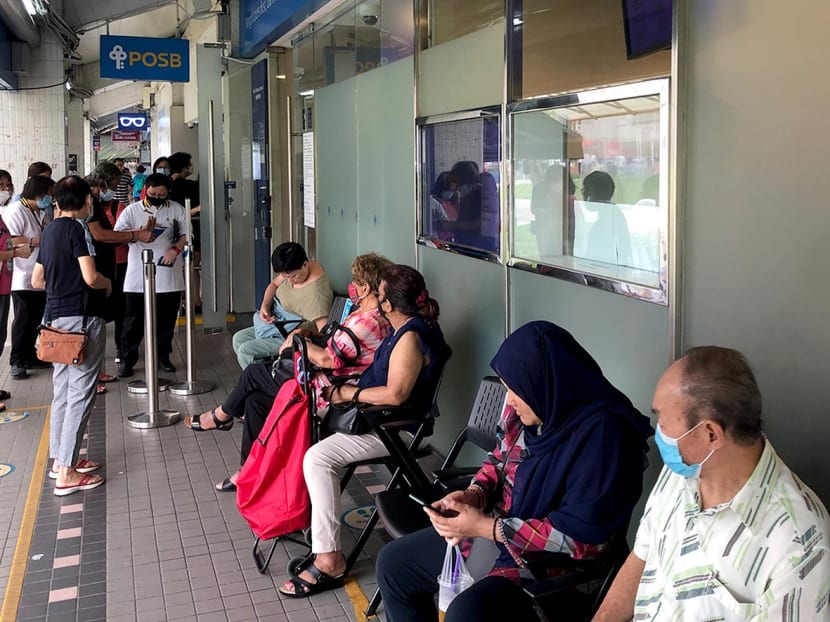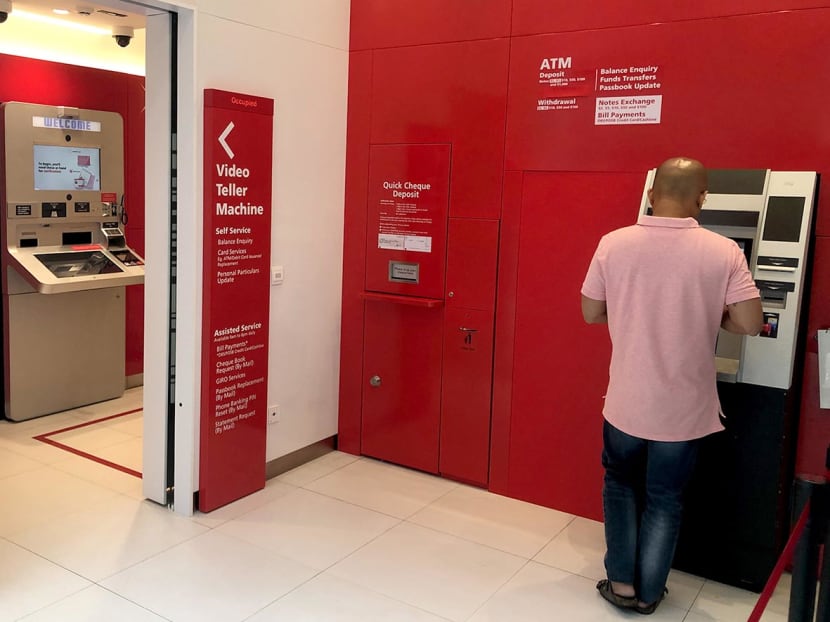The Big Read in short: Impact of digital banking divide on seniors
SINGAPORE — Retired engineer Choo Boon Hock, 72, has an internet banking account, but the only time he used it left him utterly frustrated when he found himself “going in circles” with a chatbot.
-2.jpg?itok=WgVTrM90)
Each week, TODAY’s long-running Big Read series delves into the trends and issues that matter. This week, we look at how a big push by banks towards digitalisation has left seniors feel like they have been left behind and what can be done to address the issue. This is a shortened version of the full feature, which can be found here.
- In the lead-up to Chinese New Year, long queues were spotted outside local banks and many in the line were seniors
- TODAY’s interviews with 10 seniors found that despite the push to digital banking that was accelerated by the pandemic, many still feel left behind
- As transactions essential to everyday life become increasingly automated in recent years, some seniors said they feel increasingly inadequate to perform basic banking tasks online
- Instead, they have to constantly ask their loved ones for help
- Banks said given the rapidly ageing society in Singapore, many of its initiatives were rolled out with seniors in mind
SINGAPORE — Retired engineer Choo Boon Hock, 72, has an internet banking account, but the only time he used it left him utterly frustrated when he found himself “going in circles” with a chatbot.
He typically asks his son for help if he needs to transfer funds urgently, but if the transaction can wait, he would rather do it at the bank himself.
He also likes to update his passbook every week, something he was doing on top of getting new notes to use for hongbao during Chinese New Year, when TODAY spoke to him this week at the DBS Bank branch in Hougang.
“I don’t mind the journey because every week I come to the bank to update this book…so that I know how much money I have left,” the Hougang resident said, pointing to his passbook.
Like Mr Choo, housewife Siti Rosmawati Rosli, 68, also prefers the human touch.
“Sometimes when the officers ask me questions in English and I don’t understand, I just nod my head and say yes,” said the Yew Tee resident with a chuckle.
“Sometimes (the officer) can see that I don’t understand and they would ask ‘Aunty are you sure?’ and explain it to me again.
“Can you imagine if I use the (automated teller) machines?”
In the lead-up to Chinese New Year, long queues had been spotted outside local banks and many in the line were senior citizens.
TODAY’s interviews with 10 seniors who had gone to various bank branches, mostly to withdraw and change money and update their passbooks, found that many feel like they have been left behind amid the big push towards digital banking, which has been accelerated by Covid-19.
As transactions essential to everyday life become increasingly automated in recent years, the seniors — who were raised in the age of passbooks and real bank tellers — said that they feel increasingly inadequate to perform basic banking tasks online and have to constantly ask their loved ones for help.
A majority of them also have internet banking accounts, although they hardly use them without assistance.
Common fears they have about using internet banking include:
- Clicking on the wrong buttons
- Misunderstanding something that would lead to financial loss
- Being a target of fraud

WHY IT MATTERS
The rise of digital banking means that customers can easily manage their cash, invest in a wide range of digital wealth products, open bank accounts, and apply for credit cards, home loans and personal loans without going physically to the bank branches.
And since many customers have gone online, the banks have seen footfall at their branches falling year after year and closed some of them.
This had an impact on seniors, who were very reliant on these branches for their banking needs.
Some, such as DBS Bank, have set up self-service machines which can now perform the top five most popular over-the-counter transactions.
Macpherson Member of Parliament (MP) Tin Pei Ling told TODAY that in 2015, when three banks decided to close their physical branches in the constituency, it was challenging for the seniors to travel long distances to the next branches because of their age and other physical conditions.
She and her team had to appeal to the banks several times for some support.

THE BIG PICTURE
The digital divide — which has left many seniors getting the short end of the stick — has long been a subject of national concern.
In 2020, then-Nominated MP Anthea Ong said in an adjournment motion speech that there is an urgent priority to close this divide as more needs to be done to help “digital outcasts”, such as seniors and persons with disabilities.
In response to Ms Ong’s speech, then-Minister for Communications and Information S Iswaran stressed that digital inclusion has been “at the heart of the Government’s national digitalisation effort”.
That is why the Government has rolled out initiatives such as the Silver Infocomm Initiative, launched back in 2007, which provides a range of programmes for seniors at different levels of digital skills and in vernacular languages to meet their needs.
On Friday (Jan 20), Minister for Communications and Information Josephine Teo told reporters that the Government is looking at ways to strengthen digital inclusion and is in the process of consulting stakeholders.
She reiterated that a priority is on building skills and capabilities so that people can get the best out of their digital engagements.
"It's how people can navigate the digital world with a sense of confidence. And confidence comes from skills," she said.
Ms Ong told TODAY on Thursday that as Singapore charges ahead as a smart nation, there needs to be a human-centred and empathy-based approach in the design of digital services.
“If we base our planning solely on statistics and cater only to the majority segments of our customers, then we will think of those that constitute the small percentage as 'negligible' statistics.”
THE BOTTOMLINE
Banks told TODAY that given the rapidly ageing society in Singapore, many of their initiatives were introduced with seniors in mind.
Among other things, they have hired "Digital Advocates" at branches to guide customers on how to use their digital banking platforms.
While banks have many programmes to help seniors adapt to digital banking, there is also a need to understand why it can be difficult for these older folks to keep up with them, said caregivers of the elderly and experts.

Caregivers told TODAY that digital banking services for seniors need to:
- Be predictable
- Be user-friendly
- Provide face-to-face interaction
- Boost seniors’ confidence
Sociologist Shannon Ang of the Nanyang Technological University said the push towards digital banking without paying enough attention to the needs of seniors is not an isolated issue — it adds to the many accumulated ways in which Singapore society has moved ahead at the silver generation’s expense.
The assistant professor noted that the “common but unfortunate” view is that seniors need to be open to learning and embracing technology, and giving them the resources to learn, such as structured training courses, is seen as the solution.
“The issue with this is that ultimately the onus is placed on older adults to ‘catch up’ with the pace of businesses, banks, and other institutions.”
However, he said, this is unlikely to work as the seniors who would probably benefit most, such as those isolated, less educated and time-starved, are also likely not the ones who would use these resources.
A better way to approach this is to shift the onus to institutions, including banks, that are trying to digitalise, said Asst Prof Ang.
These Institutions should bear the responsibility of minimising the burden that they impose on their most vulnerable users when implementing digital tools, whether it has to do with design, accessibility, cost, privacy, or the need to re-learn processes, he added.











